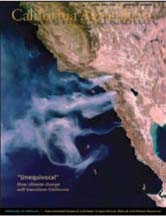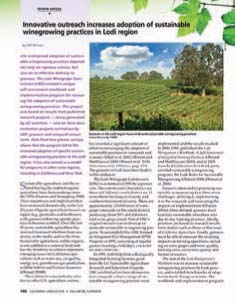Calag Archive
Calag Archive
Letters
Publication Information
California Agriculture 63(3):109-109.
Published July 01, 2009
PDF | Citation | Permissions
Full text
Bees affected by climate change?
I applaud your issue on climate change ("Unequivocal: How Climate Change Will Transform California," April-June 2009). As a commercial beekeeper, I will be affected by several aspects: the shift of agricultural and bee forage crops and native species, the increased use of pesticides, the lack of bee forage during drier summers, and increased problems with the bee parasites varroa mite and Nosema ceranae due to warmer winters. (I recently met with beekeepers in Hawaii. The varroa mite just reached the Big Island, where it will likely bring substantial changes for beekeepers and agriculture there.)
The aspect that most caught my attention is the poorer nutritional value of plants due to lower protein content, caused by higher CO2 levels. It has been apparent for a few decades that bee nutrition from pollen is not what it used to be, even in nonagricultural areas. It could well be that the plant pollens necessary for bee nutrition are simply not as high in protein as they used to be.
Randy Oliver, beekeeper Grass Valley
Need to build forestry and rangeland faculty
The recent issue clearly demonstrates the issue of global warming and how UC is actively involved. Humboldt State University is a unique CSU campus with regard to the natural resources disciplines. Programs in forestry, rangeland resources, watershed management and wildland soils produce both baccalaureate and master's graduates for employment with state and federal agencies, nongovernmental organizations, consulting firms, and forestry and rangeland industries. Some of our graduates proceed to a UC campus for graduate education. The newest direction in these disciplines is the study of carbon sequestration and global warming, demonstrating the need for faculty hires in these areas.
Cal Ag editors win silver ACE award
California Agriculture managing editor Janet Byron and executive editor Janet White received a Silver Award for Editing from the Association for Communication Excellence in Agriculture, Natural Resources, and Life and Human Sciences (ACE). The award honored their work on "Innovative outreach increases adoption of sustainable winegrowing practices in Lodi region," by Cliff Ohmart, which appeared in the October-December 2008 special issue on sustainable viticulture. Byron accepted the award on June 7 at the annual ACE conference in Des Moines, Iowa. To see the award-winning article, go to http://californiaagriculture.ucanr.org .
K.O. (Ken) Fulgham
Chair, Forestry and Wildland Resources Department
Humboldt State University, Arcata
Climate change and Chagas disease
Had I not had California Agriculture in my mailbox, my life would be less. Kudos for publishing the controversial climate change issue.
However, I ask why authors of "Climate change will exacerbate California's insect pest problems" (Trumble and Butler, pages 73-8) omitted mention of Triatoma protracta, the vector for Chagas disease. The native incidence of the disease is miniscule, but migrant workers in this country are said to number in the tens of thousands. Climate change will move the Mexican vector northward into California, and Chagas disease, already common in animal reservoirs in the state, will increase.
Bud Hoekstra
San Andreas
Author John Trumble responds: I considered including Chagas disease because, according to the National Institutes of Health, the United States has about 500,000 people infected with the trypanosome. However, the pathogen is already present in the southern United States, as is Triatoma protracta. When so many people are infected, and the pathogen can be transferred in blood transfusions, transplacentally (from mother to fetus) and via organ transplant, it is not easy to prove that an increase in cases is due to global warming rather than immigration and noninsect transmission. In addition, vector insects are already in the United States, so it would be difficult to scientifically conclude that global warming will allow Chagas disease to expand. Finally, some of the expansion will be hindered by predicted decreases in humidity in California, which reduces the lifespan of some Triatoma vectors. That said, I personally believe the letter writer is correct in that there will be further northward movement of vector species (certainly within the United States) and insect-vectored cases will likely increase.
RSVP: WHAT DO YOU THINK?
The editorial staff of California Agriculture welcomes your letters, comments and suggestions. Please write to us at 6701 San Pablo Ave., 2nd floor, Oakland, CA 94608 or calag@ucop.edu . Include your full name and address. Letters may be edited for space and clarity.



